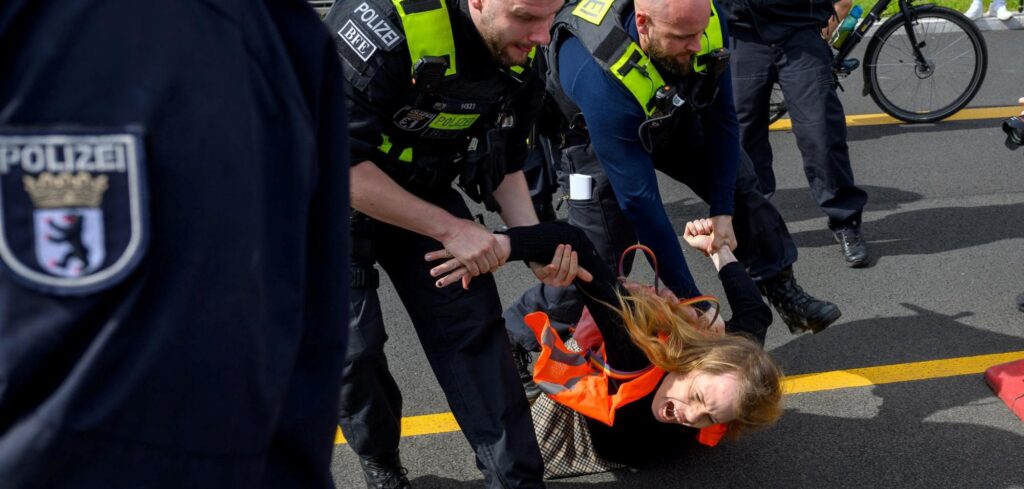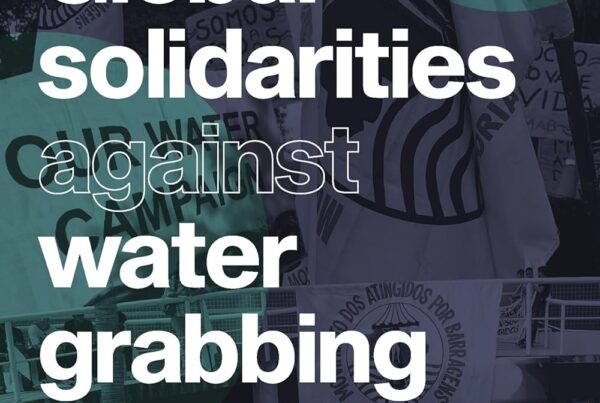by Lilith Hofmann
The first part of this essay provided an overview of police tactics and intensified violence against climate justice activists in Germany. This second part sheds light on the legislative and the judicial level. From disproportionate court decisions to stricter laws, and harsher prosecution, the German state can serve with anything.
Repressive tendencies due to legislative changes
In Bavaria, the toughest police law since 1945 came into force in May 2018. This new Bavarian Police Duties Act (PAG) was passed through the CSU-dominated state parliament without much notice. Based on this law, following a court order, citizens can now be preventively detained for up to thirty days “to avert danger” and without presenting a concrete suspicion of a crime.
The purpose is the prevention of offenses of substantial importance to the public, allowing the police to react quickly to imminent terrorist threats. Instead, it is used to prevent climate activists from taking part in protests. For example, in Munich in the fall of 2022, when thirty-three Last Generation activists were detained for up to thirty days without trial.
Or as during the protests at the International Motor Show (IAA) 2023, when twenty-seven people were arrested and detained for thirty days. According to the German Institute for Human Rights these measures are neither compatible with the German Grundgesetz, the Basic Constitutional Law of Germany, nor with international human rights guarantees.

Climate Justice Activists from Ende Gelände facing police brutality during protests against planned LNG Terminals in 2022. (source: Ende Gelände)
An anti-digger occupation in summer 2020 ended up with twenty-one arrests. During the spring of 2021, seven arrests were made, and in fall 2021, twelve arrests. These are just excerpts from a long list of arrests based on the fact that activists hid their identities and in some cases taped their fingertips. As a result, they spent up to eight days in detention.
These powers stem from the new authoritarian police law of North Rhine-Westphalia, which has been in force since December 20, 2018. The new rules on the duration of detention under §38 (2) have been invoked, which makes it possible to detain people for up to a week if it is assumed that their identity is being intentionally hidden.
If the police categorize the detention as “averting danger”, they have the option of detaining people for longer. Those affected are not entitled to a mandatory defense lawyer. In comparison, an identity check regulated in the Code of Criminal Procedure, can last a maximum of 12 hours.
The new police law is also allowing for more power of surveillance. By overriding the presumption of innocence, the police are allowed to take action even before there is any concrete danger or suspicion. This blurs the distinction between the police and secret services, endangering democracy and the rule of law.
The bill also includes new police powers available even before a crime has been committed. For example, stop-and-search checks, residence requirements and contact bans, as well as the prolonged detention of people without them being accused of a crime. Even though the law was designed to prevent terrorist threats, its first application was directed against climate justice activists.
This increasing trend towards repression is particularly evident in connection with the new Assembly Act in North Rhine-Westphalia. This new assembly law was passed on December 17, 2021 and came into force on January 7, 2022. The police were given the power to take surveillance video recordings by drone or helicopter without any preconditions and to make undercover audio and video recordings under certain conditions.
Activists registering for assemblies now have to provide detailed information and are urged to cooperate with the police. Before, it was just a matter of getting a permit. In addition, it is possible that they will have to provide personal data of the stewards to the police. Access to assemblies may become increasingly difficult due to the fact that the police now have the power to set up checkpoints.
To this, it can be added the power of the police to order a search and an identity check on the basis of suspicions of intentions to disrupt an assembly. Participation in demonstrations or counterdemonstrations can therefore also be prohibited. This law enables the police to take new measures and thus counteract protests. One could be forgiven for thinking that that attempts are increasingly being made to secure the status quo by restricting freedom of assembly.

After a gluing herself to a painting by Lucas Cranach in 2023 one of the two climate justice activists from the Last Generation is facing four months in prison without probation (credit: Paul Zinken)
The restrictive approach of the courts
Recently, there have been repeated applications by the Berlin prosecutors for accelerated proceedings in connection with the Last Generation. These “fast” procedures mean that it may not be possible to carefully examine the evidence and a full presentation of the arguments. The length of the proceedings can be shortened to a few days and the rights of the defense severely limited.
In connection with the climate justice movement, there have also been an increasing number of disproportionately long prison sentences without probation. Just recently, on August 27, 2024, a member of the Last Generation, who took part in several protests, was found guilty in the court Amtsgericht Berlin-Tiergarten. The charge: “attempted coercion“ and “resisting law enforcement“. A suspended prison sentence of two years and ten months was decided. The longest prison sentence to date for participating in a sit-in blockade. However, the judgment is not yet final, and the court first has to justify its decision in writing.
One and a half year earlier, in April 2023, the conviction for a similar action was far milder. A member of the Last Generation glued themselves to a painting in August 2022, and was also sentenced with “coercion“ and “resisting law enforcement“. However, the activist was convicted to “only” four months in prison without probation.
Countless other cases can be mentioned. An obvious extension of the prison sentences becomes clear over the course of just the last two years. The chilling effects go hand in hand with intensive criminalization, a trend that also makes increased repression visible at the judicial level.

Police officers use painful grips to drag Last Generation activists off the road. Berlin 2023 (Source: picture alliance / PIC ONE).
What remains?
The developments of the last few years are more than worrying. They could inspire a social reaction beyond the activist sphere. Or that is at least what we can hope for, since the shrinking of political and civil liberties is a threat to democracy that should concern all.
If the climate crisis is not addressed, we can certainly expect an increase in activism, even if repression intensifies. Especially when we look at the protesters and, during the last year, the brutal police reaction to demonstrations in solidarity with Palestine in Germany. We will continue to see this in the future: anyone who wants to fight against the given order will be counteracted by any means necessary.
In the capitalist system in which we find ourselves, the benefit of the powerful counts. They benefit from the misery of the many who are suffering from the effects of the climate crisis. And there is no interest in changing this. Collective resistance is still needed.
The many violations of fundamental political and civil rights are particularly worrying. Many of these measures are difficult or even impossible to reconcile with human rights. We must take great care to ensure that we do not branch off in the wrong direction. After the results of the state elections in Germany in Thuringia, Saxony and Brandenburg, we can look with concern at the climate justice movement and the associated criminalization.
The rise of a far-right party that denies climate change, among other things, is a red alert. In the face of this political change, the outcry for climate justice and anti-fascism is more important than ever, not only in Germany, but in all of Europe. And despite these frightening developments, we should retain hope, even though, in the end, we will have to fight two battles. One for a consistent climate protection agenda and the other for the protection of our democratic freedoms.




